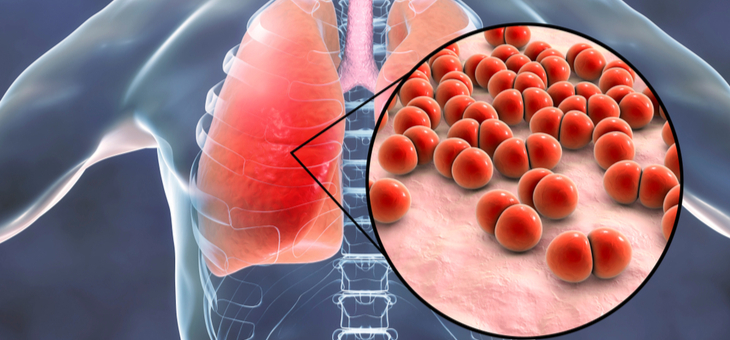Australians practicing social distancing is no doubt helping to slow the spread of coronavirus (COVID-19).
However, during Lung Health Awareness Month (May) and Pneumonia Awareness Week (11-17 May) Australians – particularly those over 65 – are being urged not to be complacent in vaccinating against another serious lung infection responsible for thousands of deaths a year.
Pneumococcal pneumonia is a potentially deadly lung infection and is one of the most common types of pneumonia, says Lung Foundation Australia.
Caused by the bacterium, Streptococcus pneumoniae, pneumococcal pneumonia targets over 65s, infants, Aboriginal and Torres Strait Islander people, those with impaired immunity, chronic tobacco smokers and people with chronic medical illnesses, such as heart, lung, kidney and liver disease, and diabetes.
Each year in Australia, pneumonia and influenza account for more than 4200 deaths, so experts are calling on those at risk to be wary of this condition coming into flu season.
“With tens of thousands of Australians hospitalised with pneumonia each year, it’s more important than ever that at-risk groups are protecting themselves against lung infections whenever possible. Although many Australians are staying at home to slow the spread of COVID-19, we mustn’t be complacent about vaccinating against pneumococcal pneumonia,” said Lung Foundation Australia Chair and leading respiratory physician Professor Christine Jenkins AM.
“The steps Australians are taking to reduce the spread of COVID-19 are making a real and positive impact. The measures currently in place are starting to flatten the curve, but this is not the time to let our guard down about other potential infections. With community transmission of COVID-19 low, now is a great time for Australians at risk of pneumonia to be ensuring their vaccinations are up-to-date to protect themselves.”
Patients with pneumonia liken it to drowning.
“I was transferred between two different emergency departments and spent four days in hospital on IV antibiotics before being sent home, but I was back in hospital again within a few days,” said 57-year-old mother of two, Marie Rogers, who spent two stints in hospital with the deadly infection in 2018.
“I thought I would recover within a couple of weeks, but I couldn’t do anything for months and months. It was about six months until I got back to where I was. I used to exercise two to three times a week, but I couldn’t even walk to the letter box – it was dreadful and scary”
Since Ms Rogers’ ordeal with pneumonia, keeping her vaccinations up-to-date is a priority each year.
“I would never want to be in that position again. Every year when I get my flu vaccination, I ask my doctor if I’m due for the pneumonia one too even though I know it lasts for five years.
“I don’t want to risk ever, ever feeling like that again. I implore anyone who is eligible to get the vaccination. It’s the most important thing you can do to protect yourself against pneumococcal infection.”
Even during the COVID-19 crisis, at-risk groups should not underestimate the importance of having the vaccination which can protect against up to 23 strains of the bacteria responsible for 85 per cent of adult pneumococcal infections in Australia, says infectious diseases specialist and microbiologist, Dr Andrew Henderson.
“The majority of Australians seem to understand the importance of vaccinating against infections like influenza, particularly given the current strain on our health system. Many at-risk Australians, however, are ignoring the importance of ensuring their pneumonia vaccination is up-to-date, with just 51 per cent vaccinating against the killer lung infection,” he said.
“For at-risk groups, such as people living with chronic lung conditions contracting pneumonia can be life-threatening with patients often requiring ventilator support.
“If ventilators are being used for other patients such as those with severe COVID-19 infection or road traumas, as an example, then it may mean a ventilator isn’t available, which could have fatal consequences.
“We understand everyone is feeling some degree of anxiety about being around others at the moment and that’s quite normal. In Australia the transmission rates for COVID-19 within the community are still very low and being monitored very closely.
“Doctor’s practices and pharmacies have stringent strategies in place to reduce the spread of the COVID-19 infection so people shouldn’t hesitate to make an appointment with their GP to get vaccinated as soon as possible.”
The two types of pneumococcal vaccine (depending on the type of risk) are provided free under the National Immunisation Program (NIP) Schedule for all Australians aged 65 and over and for other at risk people.
A second dose of vaccine is also available to Australians with immunocompromising conditions or chronic disease, or smokers, a minimum of five years following their first dose.
It is also available on the Pharmaceutical Benefits Scheme (PBS), and the NIP in some states, for all adults aged 18 years or over, who are smokers or medically at risk, such as those with chronic lung, heart or liver disease or diabetes.
Have you been vaccinated against pneumococcal pneumonia?
If you enjoy our content, don’t keep it to yourself. Share our free eNews with your friends and encourage them to sign up.
Related articles:
Answers to your flu questions
Pneumonia vaccinations
Common drugs linked to lung woes

